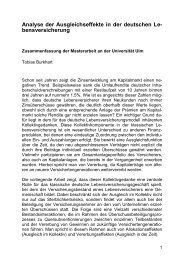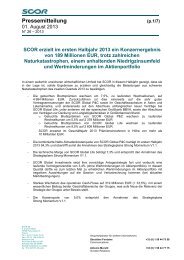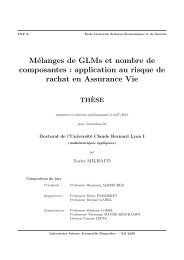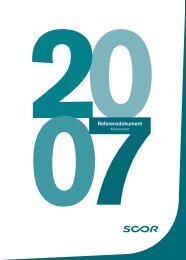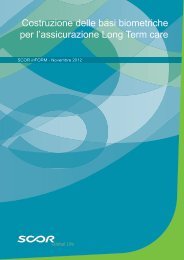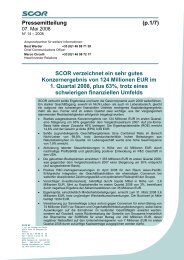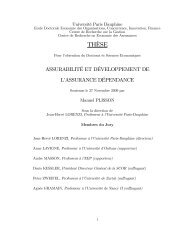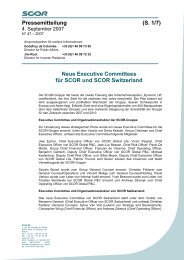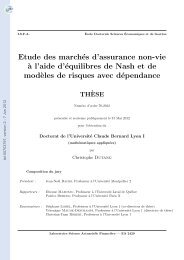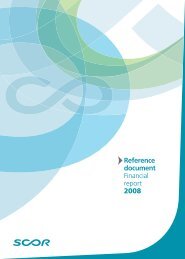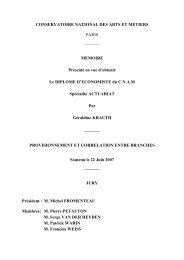4.4 Legal risk - Scor
4.4 Legal risk - Scor
4.4 Legal risk - Scor
You also want an ePaper? Increase the reach of your titles
YUMPU automatically turns print PDFs into web optimized ePapers that Google loves.
maintained by BNP on our behalf. Each Shareholder Account shows the name of the holder and such shareholder’s<br />
shareholdings and, in the case of Ordinary Shares inscribed through an accredited intermediary, shows that they are so<br />
held. BNP, as a matter of course, issues confirmations as to holdings of Ordinary Shares inscribed in the Shareholder<br />
Accounts to the persons in whose names the shareholdings are inscribed, but these confirmations do not constitute<br />
documents of title.<br />
In the case of Shares held in bearer form, the Ordinary Shares can be held on the Shareholder’s behalf by an accredited<br />
intermediary and are inscribed in an account maintained by such accredited intermediary with Euroclear France separately<br />
from the Company Share Account. Ordinary Shares held in this manner are referred to as being in bearer form. Each<br />
accredited intermediary maintains a record of Ordinary Shares held through it and will issue certificates of inscription in<br />
respect thereof. Transfers of Ordinary Shares held in bearer form may only be effected through accredited intermediaries.<br />
The Company’s bylaws (“statuts”) permit us to request from Euroclear France at any time the identity, address and<br />
citizenship of the holders of Ordinary Shares held in bearer form, as well the number of Ordinary Shares held by such<br />
persons and information regarding any restrictions that may be attached to the Ordinary Shares.<br />
The Ordinary Shares held by non-French residents can be registered in an account, either maintained by an accredited<br />
intermediary or us, under the name of their intermediary, who can represent several holders. These intermediaries, acting<br />
on behalf of shareholders living outside of France, are required to declare their capacity as intermediaries as soon as the<br />
account is opened. If we request, they must also provide the identity of the actual shareholder(s).<br />
In addition, we may, under certain circumstances as described in Section L. 228-3-1 of the French Commercial Code,<br />
request any legal entity who holds more than 2.5% of the Company’s Ordinary Shares to disclose the identity of any person<br />
who owns, directly or indirectly, more than a third of such entity’s share capital or voting rights. An entity not timely providing<br />
complete and accurate information may be deprived of its voting rights at any shareholders’ meeting held until the date of<br />
provision of the requested identification information and the payment of dividends payable to such entity is deferred until<br />
such date. If the entity knowingly (“sciemment”) refuses to comply with applicable rules, it may be deprived by a French<br />
court of all or part of the voting rights attached to the Ordinary Shares that are the subject of the information request and/or<br />
its right to dividends, for a period of up to five years.<br />
Transfer of Ordinary Shares<br />
An owner of Ordinary Shares residing outside France may trade such shares on Euronext. Should such owner, or the broker<br />
or other agent through whom a sale is effected, require assistance in this connection, an accredited intermediary should be<br />
contacted.<br />
Prior to any transfer of Ordinary Shares held in registered form on Euronext, such shares must be inscribed in an account<br />
maintained by an accredited intermediary. Dealings in Ordinary Shares are initiated by the owner giving instructions<br />
(through an agent, if appropriate) to the relevant accredited intermediary.<br />
A fee or commission is payable to the French broker, accredited intermediary or other agent involved in the transaction<br />
(whether within or outside France).<br />
Ownership of Shares by Non-residents<br />
Under current French law, there is no limitation on the right of non-residents or non-French shareholders to own securities of<br />
a French reinsurance company or to exercise the voting rights attached to such securities.<br />
A French law dated 14 February 1996 abolished the requirement that a person who is not a resident of the EU needs to<br />
obtain a preliminary authorization (“autorisation préalable”) prior to acquiring a controlling interest in a French company,<br />
except under special circumstances.<br />
Under current French foreign direct investment regulations, a notice (“déclaration administrative”) must be filed, however,<br />
with the French Ministry of the Economy in connection with (i) the acquisition by any person not residing in France or any<br />
group of non-French residents acting in concert if such acquisition results in the ownership by the acquirer(s) of more than<br />
33.33% of the share capital or voting rights or (ii) the acquisition of the Ordinary Shares or voting rights of the Company by a<br />
French company in respect of which more than 33.33% of its shares or its voting rights are held by a person not residing in<br />
France or a group of non-French residents acting in concert if such acquisition results in the ownership by the foreign<br />
controlled French company of more than 33.33% of our outstanding shares or voting rights.<br />
21.2.5 ACTIONS REQUIRED TO MODIFY SHAREHOLDERS’ RIGHTS<br />
The rights of shareholders are set forth in the bylaws of the Company. Under Article L.225-96 par. 1 of the French<br />
Commercial Code, amendments to the bylaws must be approved by the Extraordinary Shareholders’ Meeting, by a majority<br />
vote of two-thirds of the shareholders present or represented.<br />
Attendance and voting at shareholders’ meetings<br />
In accordance with French law, there are two types of general shareholders’ meetings, ordinary and extraordinary.<br />
Ordinary general meetings of shareholders are required for matters such as the election, replacement and removal of<br />
directors, the appointment of statutory auditors, the approval of the annual report prepared by the Board of Directors and of<br />
304



